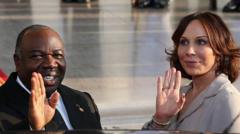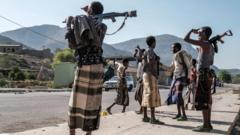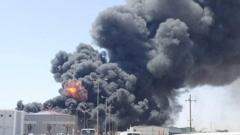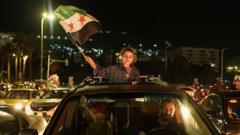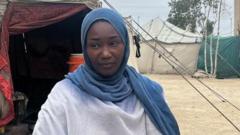*Abdi Latif Dahir reports from Nairobi on the precarious political situation in South Sudan, where the vice president's detention has triggered fears of renewed conflict.*
**South Sudan Faces Tumultuous Times as Vice President Is Detained**

**South Sudan Faces Tumultuous Times as Vice President Is Detained**
*Internal conflict threatens stability in the world’s youngest nation amid rising tensions between leadership.*
South Sudan's vice president, Riek Machar, has been confined to his residence in an affluent area of the capital, Juba, since March this year. He is held under strict surveillance, with armored vehicles stationed outside and guards equipped with AK-47s maintaining watch over the compound. His situation is dire; all means of communication have been confiscated, leaving him isolated from the world. His wife, who is a government official, is permitted to prepare meals for him but is prohibited from personally delivering them.
As the world's newest nation, South Sudan, with a population of approximately 11 million, gained independence from Sudan in 2011, aided significantly by the United States. However, within two years, the country was engulfed in a brutal civil war marked by ethnic tensions, with Machar and President Salva Kiir on opposing sides. In 2020, both leaders reached a peace agreement to create a unity government aimed at stabilizing the nation and paving the way for future elections. Nevertheless, this fragile peace is now threatened, particularly as Machar stands accused of inciting an uprising through a militia known as the White Army. This group has also been linked to the downing of a UN helicopter earlier in March.
The alarming absence of a succession plan, coupled with escalating violence, raises serious concerns that South Sudan may again plunge into chaos, potentially resulting in a significant wave of refugees heading toward neighboring nations like Ethiopia and Sudan, both of which are grappling with their own crises of war and famine. Uganda has already committed troops to bolster Kiir’s administration in response to the crisis.
“The situation in South Sudan is at a critical and terrible juncture,” commented Puok Both Baluang, the acting press secretary for Machar. He characterized the vice president’s detention as unconstitutional and a violation of his rights, emphasizing the need for immediate attention to prevent further escalation.
As the world's newest nation, South Sudan, with a population of approximately 11 million, gained independence from Sudan in 2011, aided significantly by the United States. However, within two years, the country was engulfed in a brutal civil war marked by ethnic tensions, with Machar and President Salva Kiir on opposing sides. In 2020, both leaders reached a peace agreement to create a unity government aimed at stabilizing the nation and paving the way for future elections. Nevertheless, this fragile peace is now threatened, particularly as Machar stands accused of inciting an uprising through a militia known as the White Army. This group has also been linked to the downing of a UN helicopter earlier in March.
The alarming absence of a succession plan, coupled with escalating violence, raises serious concerns that South Sudan may again plunge into chaos, potentially resulting in a significant wave of refugees heading toward neighboring nations like Ethiopia and Sudan, both of which are grappling with their own crises of war and famine. Uganda has already committed troops to bolster Kiir’s administration in response to the crisis.
“The situation in South Sudan is at a critical and terrible juncture,” commented Puok Both Baluang, the acting press secretary for Machar. He characterized the vice president’s detention as unconstitutional and a violation of his rights, emphasizing the need for immediate attention to prevent further escalation.

